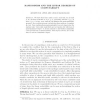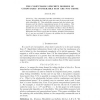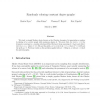848 search results - page 1 / 170 » Randomness and the linear degrees of computability |
APAL
2007
13 years 4 months ago
2007
We show that there exists a real α such that, for all reals β, if α is linear reducible to β (α ≤ β, previously denoted α ≤sw β) then β ≤T α. In fact, every random ...
STOC
2006
ACM
14 years 4 months ago
2006
ACM
: We derandomize results of H?astad (1999) and Feige and Kilian (1998) and show that for all > 0, approximating MAX CLIQUE and CHROMATIC NUMBER to within n1are NP-hard. We furt...
CIE
2009
Springer
13 years 11 months ago
2009
Springer
We show that every real low for Demuth randomness is of hyperimmune-free degree.
APAL
2010
13 years 4 months ago
2010
The computable Lipschitz reducibility was introduced by Downey, Hirschfeldt and LaForte under the name of strong weak truthtable reducibility [6]. This reducibility measures both t...
FOCS
2004
IEEE
13 years 8 months ago
2004
IEEE
We study a simple Markov chain, known as the Glauber dynamics, for generating a random k-coloring of a n-vertex graph with maximum degree . We prove that, for every > 0, the d...



